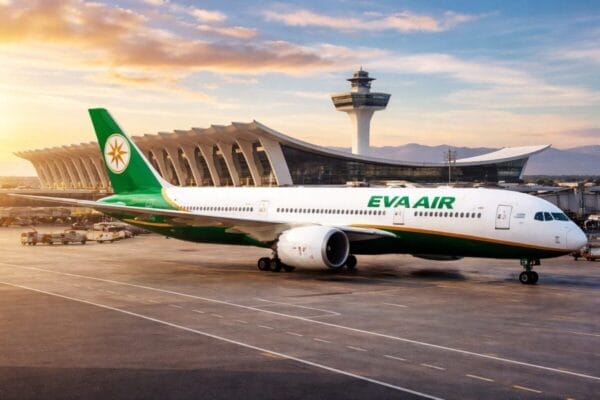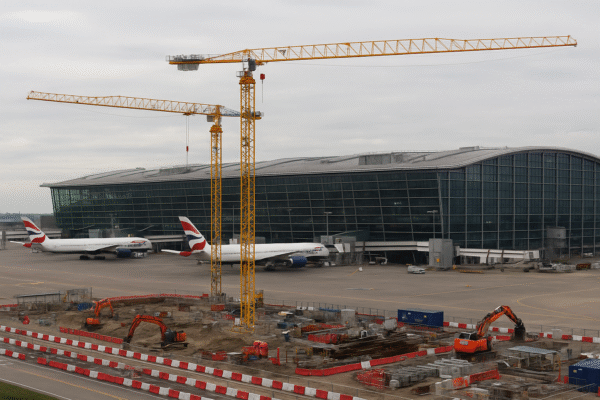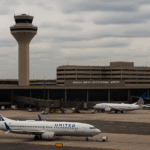London’s Heathrow Airport, Europe’s busiest air hub, is undergoing a massive £10 billion expansion that will shape the future of UK aviation. The project, designed to increase passenger capacity by 10 million annually, includes sweeping upgrades to security, baggage handling, and terminal services. But as Heathrow sets its sights on becoming a world-class aviation gateway, tensions are rising between the airport and airlines over who should bear the financial burden of the transformation.
A Strategic Move to Modernise and Compete Globally
In the first half of 2025 alone, Heathrow welcomed nearly 40 million passengers. Despite its already high traffic volume, airport management believes that significant infrastructure investment is the only way to keep up with global competition. Heathrow’s CEO, Thomas Woldbye, insists that failing to invest now risks losing ground to rival hubs like Dubai, Doha, and Frankfurt.
Key features of the upgrade include:
- Next-generation security scanners that allow liquids and electronics to remain in hand luggage
- AI-based punctuality systems to reduce delays
- Enhanced baggage systems
- New lounges, shops, and restaurants to improve the passenger experience
The centrepiece of the proposed expansion is the long-delayed third runway, which will allow Heathrow to handle increased air traffic and secure its place as a global aviation leader.
Airlines Push Back on Rising Charges
Despite the grand vision, airlines operating at Heathrow are pushing back hard against proposed fee hikes to fund the project. Heathrow plans to raise landing charges from £28.46 to £33.26 per passenger by 2027, subject to Civil Aviation Authority (CAA) approval. The proposed fees are expected to be fully implemented by 2031.
Carriers such as Virgin Atlantic and British Airways’ parent company, IAG SA, have described the increases as excessive. They argue that these costs will be passed directly onto passengers, making air travel through Heathrow less affordable.
A coalition of airlines has also launched a campaign to reduce Heathrow’s market dominance, advocating for more competitive operating conditions and a review of the airport’s fee-setting structure.
Why the Investment Is Considered Urgent
The need for the expansion has been further underscored by recent disruptions. A fire at Heathrow’s North Hyde electrical substation earlier in 2025 resulted in a nearly full-day shutdown. An investigation by the National Energy System Operator (Neso) found that the fire was caused by long-term moisture exposure—an example of aging infrastructure creating vulnerabilities in airport operations.
Additionally, current passenger processing times and service delays suggest that Heathrow’s existing facilities are reaching their operational limits. Without upgrades, the airport could face further congestion, flight delays, and dissatisfied travelers—risks that Heathrow leadership insists must be avoided.
Impact on Passengers: Higher Costs, Better Experience
For travelers, the most immediate concern is the likely rise in ticket prices as airlines offset higher landing fees. While the full impact of the expansion won’t be felt until closer to 2031, airfares through Heathrow may gradually climb in the interim.
At the same time, the improvements are set to enhance the passenger journey:
- Security checks will become faster and less invasive
- Baggage handling will be more efficient, reducing lost luggage
- Terminal upgrades will provide a more comfortable and modern environment
Frequent flyers may especially benefit from AI-powered systems designed to minimize delays and streamline departures. For business and long-haul travelers, these enhancements could add tangible value.
The Third Runway Debate: Environmental and Economic Stakes
One of the most contentious aspects of the expansion is the proposed third runway. While crucial for increasing capacity, the plan has drawn criticism from environmental groups and local communities concerned about noise and emissions. The UK government had previously backed the project, but legal challenges and environmental reviews continue to complicate progress.
Supporters argue that the runway is essential for long-term economic growth. A 2019 Department for Transport study estimated that Heathrow’s expansion could generate up to £61 billion for the UK economy over several decades and create tens of thousands of jobs across Greater London and the South East.
Regional and Global Implications
Beyond the airport itself, the expansion has broad implications for UK tourism, trade, and international connectivity. As a primary entry point to Britain, Heathrow’s modernization could enhance the country’s reputation as a premier global destination—especially important as the UK seeks to bolster inbound travel and business post-Brexit.
Improved infrastructure at Heathrow is expected to make the UK more accessible to travelers from North America, Asia, and the Middle East, strengthening connections to tourism hotspots such as Scotland, the Lake District, and the Cotswolds.
What Comes Next?
The UK Civil Aviation Authority is currently reviewing Heathrow’s pricing proposal. A final decision on the fees—and approval for the next phases of the expansion—is expected by early 2026. Meanwhile, Heathrow has committed to consulting stakeholders, including airlines and passenger groups, throughout the process.
In the coming years, travelers can expect a gradual rollout of new technology and terminal upgrades, though the financial trade-offs will remain a concern. The full scope of benefits—reduced wait times, better service, and increased connectivity—may not be realized until the early 2030s.
Conclusion
Heathrow Airport’s £10 billion expansion is set to reshape the UK’s aviation future. While promising a more modern, efficient travel experience, it also raises tough questions about cost-sharing and environmental impact. As the airport moves forward, striking the right balance between investment and affordability will be critical for maintaining traveler satisfaction and global competitiveness.
For more travel news like this, keep reading Global Travel Wire
















